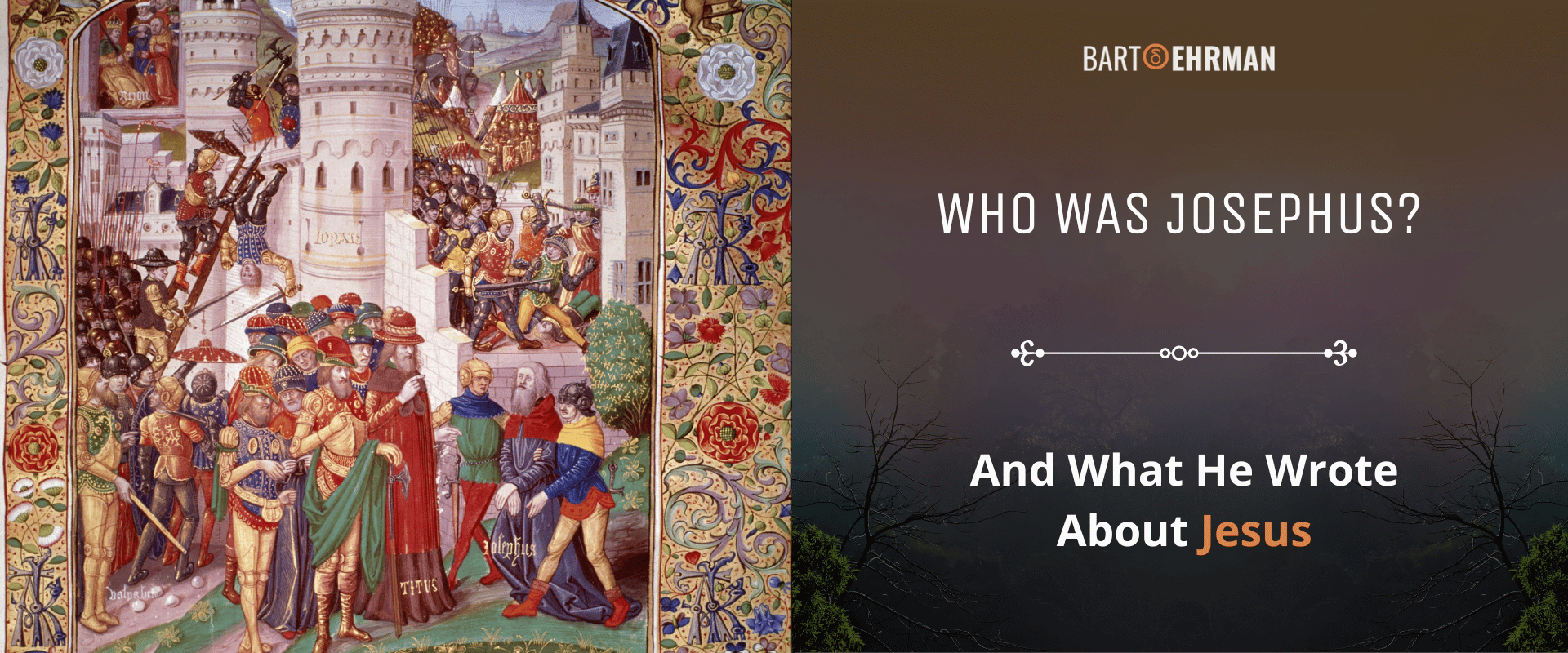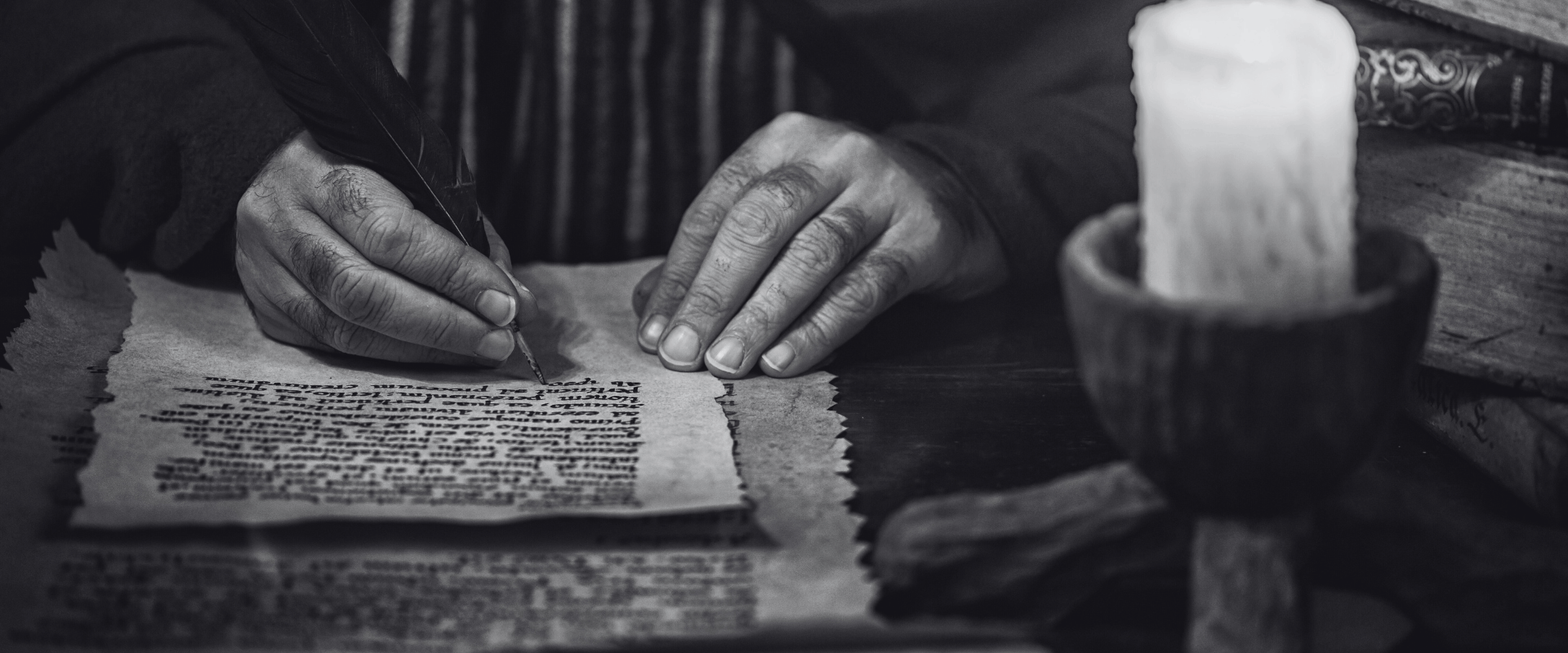Who Was Josephus? (And What He Wrote About Jesus)

Written by Marko Marina, Ph.D.
Author | Historian
Author | Historian | BE Contributor
Verified! See our guidelines
Verified! See our editorial guidelines
Date written: March 25th, 2024
Edited by Laura Robinson, Ph.D.
Disclaimer: The views and opinions expressed in this article belong to the author and do not necessarily match my own. - Dr. Bart D. Ehrman
The name Flavius Josephus always reminds me of my first encounter with him and his writings. In the first lecture of my graduate course on Early Christianity, a fierce debate emerged between my professor and one of the students about the importance of Josephus' testimony in establishing the historicity of Jesus.
The intensity of that discussion underscored the pivotal role Josephus plays in the study of Early Christianity and the broader field of ancient history.
Flavius Josephus, a name that stands at the crossroads of Judaism and early Christianity, offers a unique perspective on the tumultuous era that saw the rise of both these faiths against the backdrop of Roman dominion. Born into a priestly Jewish family in the first century C.E., Josephus found himself amid political upheaval, war, and cultural transformation.
This article aims to shed light on the life of Josephus, delving into his birth, upbringing, and the dramatic turn of events that led him to adopt Roman citizenship and a new name.
We’ll touch upon his major works, including “The Judean War” and “Antiquities of the Jews”, with a particular focus on his references to Jesus and other figures from the New Testament.
Join us as we embark on this journey through the life and legacy of Flavius Josephus, whose writings continue to intrigue, inform, and inspire debate among historians and scholars across the world.
But, wait a minute! Before we begin, I must invite you to consider joining a captivating course “Paul and Jesus: The Great Divide” by a renowned scholar of early Christianity Bart D. Ehrman. In it, Dr. Ehrman explores the key theological differences between two pivotal figures of the world’s most popular religion!

Josephus: Early Life Set in the Historical Context
Born Yosef ben Matityahu in Jerusalem, in 37 C.E., Josephus lived through one of the most tumultuous periods in Jewish history. His life spanned the Roman occupation of Judea and the First Jewish–Roman War, events that shaped the socio-political landscape of his time.
The backdrop of Josephus' early years was marked by increasing tensions between the Jewish population and the Roman authorities, tensions that would eventually lead to the catastrophic Jewish Revolt and the destruction of the Temple in 70 C.E.
Within this volatile environment, Josephus' family background offered him a unique vantage point from which to observe and later narrate the complexities of Judean society.
Discussing Josephus' lineage in his autobiography, Vita, Frederick Raphael notes, "Since childhood was never a topic in ancient literature, Josephus’ Vita doesn’t describe his early years. He merely lays claim, through a remote ancestor of his mother’s, to 'royal' blood (that of the 'Hasmonaeans,' as the Maccabees were formally known)... Although Josephus doesn’t give any details of his father’s wealth or property, he takes pride in belonging to a leading, certainly conservative, family."
Josephus’ Education & Mastery of Greek
This assertion of noble and priestly heritage underscores Josephus' standing within the Judean society—a position that afforded him both privilege and perspective.
As a member of a priestly and noble family, Josephus would have had access to a traditional Jewish education, which included learning Hebrew scriptures and possibly some aspects of Jewish law and traditions.
In his Vita (2.7.), Josephus, for instance, describes how he, at the age of 16, undertook a journey to learn about the various sects within Judaism. These included the Pharisees, Sadducees, and Essenes, as well as a fourth group, led by a man named Banus, who lived in the desert and practiced a lifestyle of purification and asceticism.
Furthermore, through his writings, he demonstrated a considerable knowledge of the Greek language and literature. However, Josephus himself notes that he didn’t learn Greek until he went to Rome (Against Apion 1.50.) and, sometimes, he used the help of his literary assistants to polish his Greek.
Nevertheless, Josephus possessed significant composition and language skills. But how widespread was this level of education? Should we just assume that Josephus was one of the many educated Jews living in 1st-century Palestine?
Referring to the customs of Jews, he notes: “We take pride in raising children and make keeping the laws and preserving the traditional piety that accords with them the most essential task of our whole life (Against Apion 1.12.60.).”
In another instance, Josephus mentions that the Jewish children were instructed in reading so that they knew the laws and knew about their forebears and the virtues they stood behind (Against Apion 2.25.204.).
However, critical scholars acknowledge that Josephus here presents an ideal, formulated from the perspective of well-educated upper-class Jews. In other words, he projects his elite status to all of the Jews.
In reality, literacy rates were extremely low and the majority of people were either illiterate or literary only at the very simplest level. The elite to which Josephus surely belonged, however, had access to both Jewish and Greco-Roman education.
Josephus’ Significance
Who was Josephus? He wasn’t merely a historian but also a man deeply entrenched in the religious and political fabric of his time. His writings, from this standpoint, do not merely chronicle historical events but also offer a window into the identity, beliefs, and struggles of the Jewish people under Roman rule.
Josephus' works, therefore, serve as a valuable source for the Jewish world of the Second Temple period, offering insights into the historical context (e.g. Pharisees) of early Christianity and the Judaic traditions from which it emerged.
But his works also provide us with a notable glimpse into the broader currents of the Roman Empire. That brings us to the biggest change in Josephus’ life. How did a Jewish military leader and historian become one of the emperor’s closest associates? Let’s take a look!
FREE COURSE!
WHY I AM NOT A CHRISTIAN
Raw, honest, and enlightening. Bart's story of why he deconverted from the Christian faith.
Over 6,000 enrolled!
The Turn of the Lifetime: Josephus and the Roman Rule
You might think that Jews were the ones diligently copying Josephus' writings through the ages, but you would be quite off the mark. Despite Josephus' significant contributions to historical writing and our understanding of the Judeo-Roman world, his standing among his fellow Jews in late antiquity and beyond was, to put it mildly, less than stellar.
Josephus, once a dedicated Jewish priest and a leader in the Jewish revolt against Rome, became "persona non grata" (an unwelcome person) among his people for reasons that are as complex as they are intriguing.
Josephus' journey from a Jewish rebel to a Roman historian is a tale of survival, adaptation, and transformation. During the First Jewish-Roman War (66-70 C.E.), Josephus served as the commander of the Jewish forces in Galilee. However, after the Roman forces besieged and captured Jotapata, Josephus and his companions were taken prisoner.
It was here, in captivity, that Josephus' life took a dramatic turn. According to his account, he provided the Romans with intelligence and, after a prophecy that Vespasian would become Emperor, ingratiated himself with the Roman leaders.
Per Bilde describes the event that unfolded right after Josephus surrendered: “On the way, the Romans gathered around him to get a glimpse of the Jewish general, and many Roman officers, among whom was Titus (Vespasian’s son) took pity on him. Therefore, Titus appealed for Josephus, and this is the main reason why his life was spared.”
Vespasian, upon becoming Emperor, granted Josephus his freedom, after which Josephus assumed the Flavian family name, becoming Flavius Josephus.
This act of survival, however pragmatic, was seen by many Jews as an outright betrayal. Josephus' transition from a Jewish commander to a historian under the patronage of the Flavian dynasty (the very rulers who crushed the Jewish revolt and destroyed the Second Temple) solidified his reputation as a traitor among his people.
As a Roman citizen and a client of the Flavian emperors, Josephus wrote extensively about Jewish history, the Jewish War, and other topics from a perspective that many contemporaries and later Jewish readers found uncomfortably reconciled with Roman viewpoints.
Navigating the delicate line between historical record and personal allegiance, Josephus’ life story sets the stage for a deeper exploration of his literary legacy.
As we transition from the controversies of his journey to the contributions of his pen, it’s clear that Josephus' writings, born out of a unique blend of Jewish heritage and Roman patronage, offer a rich tapestry of insights into the ancient world.
Josephus’ Books: A Brief Overview
Josephus' books provide a comprehensive look into the Jewish world under Roman rule, offering insights that have been pivotal to both historians and theologians. Here, we briefly explore his most significant works, each a cornerstone of ancient historiography and apologetics.
#1 The Judean Wars
This work chronicles the Jewish revolt against Rome from 66 to 70 C.E., beginning with the events leading up to the conflict and concluding with the fall of Masada in 73 CE. Josephus provides a detailed account of the war, blending historical narration with his eyewitness testimony.
As Steve Mason remarks, "The Judean War deserves its place among the most influential ancient Western texts... Josephus manages the extraordinary feat of meshing his native traditions with Greek political, rhetorical, and historiographical discourses, while yet distancing himself from 'the Greeks' to cement the bond with his host society."
#2 Antiquities of the Jews
Completed in 93 CE, this extensive work traces the history of the Jewish people from the creation of the world as described in the Hebrew Bible to the outbreak of the Jewish revolt in 66 CE. Through 20 volumes, Josephus aims to present the Jewish people and their history in a favorable light to a Greco-Roman audience.
By contextualizing Jewish customs, laws, and beliefs within the broader tapestry of ancient history, Josephus not only seeks to explain Judaism to non-Jews but also to elevate the stature of Jewish history within the annals of the ancient world.
#3 The Life of Flavius Josephus (Vita)
This autobiography defends Josephus' actions during the Jewish revolt and his conduct as a commander in Galilee. It was written as a response to criticisms levied against him, particularly by Justus of Tiberias.
Through "Vita", Josephus presents his genealogy, education, and the philosophical and moral stances that guided his actions, offering readers a glimpse into the personal and intellectual journey that shaped his other works.
#4 Against Apion
This apologetic text is a defense of Judaism as a religion and the Jewish people as a cultural and historical entity, written against the backdrop of Greco-Roman prejudice and misunderstanding.
Josephus counters the accusations and misrepresentations of the Jewish people made by Apion and other critics, using a blend of historical argumentation, philosophical discourse, and literary analysis.
John M. G. Barclay’s assessment captures the essence of Josephus' approach: “In this work, we encounter Josephus at his rhetorical best: he displays an impressive cultural range in the knowledge of Greek history, historiography, and philosophy, and his interlocking arguments in defense of Judeans are spiced with acute literary analysis and clever polemics.”
“Against Apion” is thus a testament to Josephus’ skill in navigating and challenging the cultural and intellectual currents of his time.
Each of these works, in its way, contributes to our understanding of the ancient world, offering perspectives that are as enriching as they are essential for grasping the complexities of Jewish history and its interactions with the Greco-Roman world.
Now… Do you recall that spirited debate over Josephus' role in pinning down the historical Jesus I mentioned in the introduction?
It turns out there's more to that classroom clash than meets the eye. As we turn the page from Josephus' vast historical landscape to a particularly contentious patch of textual terrain, let's dive into the heart of that argument.

Josephus’ Description of Jesus: Testimonium Flavianum
Within the extensive writings of Flavius Josephus, a brief passage in "Antiquities of the Jews" has ignited centuries of scholarly debate. Known as the Testimonium Flavianum, this testimony presents a concise account of Jesus, stating:
Now there was about this time Jesus, a wise man, if it be lawful to call him a man, for he was a doer of wonderful works, a teacher of such men as receive the truth with pleasure. He drew over to him both many of the Jews and many of the Gentiles. He was the Christ; and when Pilate, at the suggestion of the principal men amongst us, had condemned him to the cross, those that loved him at the first did not forsake him, for he appeared to them alive again the third day, as the divine prophets had foretold these and ten thousand other wonderful things concerning him; and the tribe of Christians, so named from him, are not extinct to this day
This passage has long been a cornerstone for those arguing for a non-Christian corroboration of Jesus' historical existence and his early followers. However, the enthusiastic depiction of Jesus has led many scholars to question its authenticity, suggesting that the highlighted parts above are likely later interpolations by Christian scribes.
In other words, Josephus wasn’t a Christian which makes certain parts of his testimony questionable.
Bart D. Ehrman elucidates this skepticism by highlighting the transmission history of Josephus' works: "It was Christians who copied Josephus' writings through the ages... This reference to Jesus was beefed up a bit by a Christian scribe who wanted to make Josephus appear more appreciative of the 'true faith'.”
Further solidifying this skepticism, John P. Meier offers a critical analysis of the text's flow and tone, noting, "In short, the first impression of what is Christian interpolation may well be the correct impression. A second glance confirms this first impression. Precisely these three Christian passages are the clauses that interrupt the flow of what is otherwise a concise text carefully written in a fairly neutral or even purposely ambiguous tone."
In conclusion, while Josephus' mention of Jesus in “Antiquities of the Jews” continues to be a subject of intense scholarly interest, the consensus leans towards a cautious approach.
The majority of scholars agree that while Josephus likely mentioned Jesus, the more explicit references to his divinity and resurrection are the product of later Christian interpolations, aimed at enhancing the narrative to align with Christian doctrine.
Josephus and Other New Testament Figures
The importance of Josephus is also seen in the fact that he mentions other figures in the New Testament, further bridging the gap between Jewish and early Christian histories.
Beyond the debated testimony about Jesus, Josephus provides accounts of John the Baptist and James, the brother of Jesus, offering invaluable external attestations to their historical existence and roles within the broader narrative of Judea under Roman rule.
These references, found within the broader tapestry of Josephus' work, lend a small layer of historical credibility to the New Testament accounts, situating these figures within the tumultuous socio-political context of first-century Judea.
For instance, Josephus' portrayal of John the Baptist underscores his significant influence as a religious figure, echoing the New Testament's depiction of him as a prophet and a forerunner to Jesus.
Similarly, Josephus' mention of James' martyrdom not only corroborates the New Testament's depiction of James as a key figure in the early Christian community but also reflects the complexities of religious leadership in a time of political upheaval.
These accounts, while brief, are critical for historians and scholars, providing a “secular” corroboration of certain elements within New Testament narratives.
Through these references, Josephus unwittingly becomes a vital link in the historical chain connecting Jewish history with the emergent Christian tradition, illustrating the intertwined destinies of these communities within the Roman Empire.
Conclusion
In retracing the life and legacy of Flavius Josephus, we journey through the intersections of Jewish and early Christian histories, witnessing the complexities of a world under Roman rule through the eyes of a singular figure.
Josephus, through his detailed historical accounts, serves not only as a crucial source for understanding the First Jewish–Roman War and the socio-political dynamics of Judea but also as a bridge connecting the Jewish traditions of the Second Temple period with the nascent Christian movement.
Josephus’ portrayals of key biblical figures and events provide a rare external perspective that enriches our understanding of the historical contexts in which these figures lived and the movements they inspired.
While his writings have been scrutinized for their accuracy and biases—particularly his references to Jesus, John the Baptist, and James—they remain indispensable for historians and theologians alike, offering insights that transcend the boundaries of religion and scholarship.
And how did that spirited debate that I mentioned at the beginning end? Well, the professor won. Isn't that always the case?
FREE COURSE!
WHY I AM NOT A CHRISTIAN
Raw, honest, and enlightening. Bart's story of why he deconverted from the Christian faith.
Over 6,000 enrolled!
